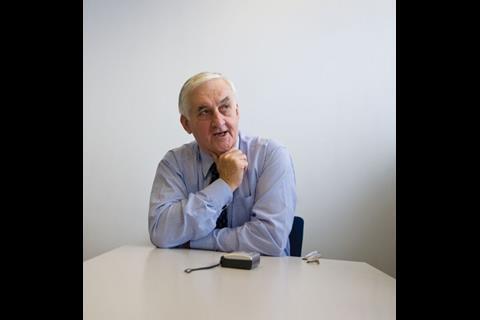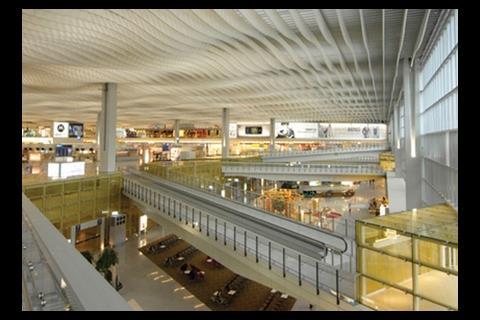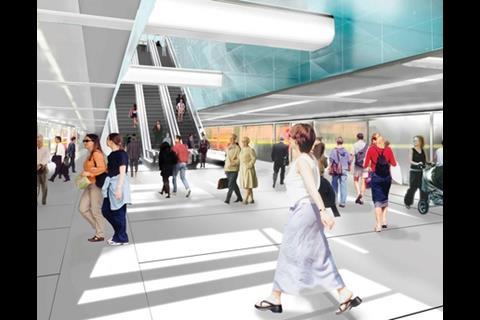After 18 years, the £16bn Crossrail project has finally got the go-ahead. Now chairman Doug Oakervee, in his first interview, explains how he will fulfil his promise not to go a penny over budget.
Crossrail‚Äôs offices in Victoria are very grey and very quiet ‚Äď eerily so, given this is the nerve centre of one of the biggest infrastructure projects London has ever seen, and that it‚Äôs just been given the go-ahead after 18 years of planning.
The prime minister unveiled a funding package of £16bn for the project two weeks ago, and the Crossrail Bill is expected to gain royal assent next summer.
Then again, you’d expect Crossrail’s 500 staff to be a little weary. The parliamentary process has been a long hard slog, with hundreds of thousands of pages of detailed designs being drafted and an exhausting public consultation process. And they still haven’t got anywhere near breaking ground for the 11 miles of wide-bore tunnels underneath London.
The man in charge of energising the organisation for the struggle ahead is Doug Oakervee, who has been executive chairman of Crossrail since December 2005. His role over the past two years has been a behind-the-scenes one; now he will have to step out of the shadows.
Since the chancellor‚Äôs announcement, his life has been ‚Äúone long meeting‚ÄĚ, his press spokesperson says, whether facing politicians, construction chiefs or a grilling from an Essex radio station about journey times from Shenfield. Even so, when I‚Äôm shown into his office, he seems remarkably chilled out, alternating between measured explanations and bursts of easy laughter.
So, after all the false starts, is Crossrail really going to go ahead now? ‚ÄúYes, definitely,‚ÄĚ says Oakervee. ‚ÄúWe‚Äôve almost finished the parliamentary process in the Commons. The big showstopper was the funding package.‚ÄĚ He‚Äôs also confident that the Thames Gateway spur of the scheme will be completed along with the rest by 2017, despite speculation to the contrary.
Oakervee must be the only person in the country who was always sure it would go ahead. He was appointed part-time chair in December 2005, while he was project director on P&O‚Äôs port development at Shellhaven, Essex, and moved over full-time in July 2006. ‚ÄúI was put in to make sure we got the thing on the road and so, in that sense, I‚Äôve always been confident we‚Äôd get it through,‚ÄĚ he says.
As president of the Institution of Civil Engineers (ICE) in 2004, even before he was involved in the project, he wrote a letter to The Guardian urging the government to back Crossrail (he says Norman Haste, the former Cross London Rail Links chief executive, put him up to it). ‚ÄúNo, I had no idea I‚Äôd ever take it over,‚ÄĚ he guffaws.
Any misgivings that Oakervee is more of a lobbyer than a doer are dispelled by his CV ‚Äď from 1991 to 1999 he was project director for the Hong Kong international airport, from masterplanning to completion. He‚Äôs got 21 different letters after his name, including an OBE for services to civil engineering overseas.
The big question is how on earth he’s going to keep it on budget when major government projects seem to be overrunning every week. The £16bn figure takes into account inflation up to the 2017 completion date, and Oakervee says it’s fixed. But this will mean battling political intervention, government changes of heart and unforeseeable inflation. Why should Crossrail be able to ride the storm when the Olympics is already eating into its contingency?
Unlike the Olympics, he says, Crossrail’s false starts have actually helped it plan in more detail. “Over the past 18 months we’ve re-estimated the project and refined the design. These have been cross-examined not only by us but by external parties. We’re confident we’ve got a robust estimate; the Olympics had to do that on the run.
‚ÄúThere is no question of cost overruns on this job. The government has made that clear. It‚Äôs such a huge project that we‚Äôve got to keep very tight discipline on it.‚ÄĚ
So will you put your hand on your heart and promise that it will cost no more than ¬£16bn? Oakervee doesn‚Äôt pause: ‚ÄúYes, yes.‚ÄĚ
‚ÄúThe key is making certain the design embraces the functionality of the railway, that it is agreed by the operators and sponsors and that we don‚Äôt deviate from it.‚ÄĚ He smiles knowingly. ‚ÄúThat has been taken on board by the government.‚ÄĚ
Crossrail is running a tight ship on changes, he says. ‚ÄúCost and time overruns on major projects are usually because the scope wasn‚Äôt defined properly at the outset. The client changes it and then wonders why the contractor charges more. That‚Äôs what we‚Äôre hellbent on not allowing.‚ÄĚ
Given past form, he‚Äôll be able to fight his corner. In fact, his management style was criticised as ‚Äúaggressive‚ÄĚ by a government inquiry into systems failures on the opening of Hong Kong airport. Did he think that was fair? ‚ÄúI think they called me a bulldozer and when asked what I thought of that, I said I couldn‚Äôt think of a better definition of a project director!‚ÄĚ he laughs again. ‚ÄúI‚Äôve had members of my team with me for years so I can‚Äôt be that bad.‚ÄĚ
Oakervee wants to work with contractors on ways to fabricate the tunnel linings, some installations and the stations off site. Crossrail involves tunnelling across central London, through utilities, sewers and transport links, and building seven vast underground stations ‚Äď so it‚Äôs fair to say the logistics are going to be a challenge. He also knows getting it wrong would ‚Äúbring London to a standstill‚ÄĚ.
One obvious challenge is getting rid of the spoil. This will be removed at the western and eastern ends, rather than points along the way. Oakervee has a plan to minimise lorry movements during station construction ‚Äúvery dramatically‚ÄĚ but won‚Äôt say what it is yet.
In November, he will hold discussions with utilities companies Transport for London (TfL), and hopefully Network Rail and London Underground, to co-ordinate their major works programmes. ‚ÄúWe‚Äôre going to look at these holistically so we can do them in a sequence that meets our needs.‚ÄĚ
Crossrail‚Äôs construction will peak in 2013, with 14,000 workers on site, so it won‚Äôt clash with the Olympics, but Oakervee is concerned it will compete with projects such as the Thames Tideway tunnel. ‚ÄúWe‚Äôre talking to the owners and developers responsible for these projects to co-ordinate our works so we have a consistent workflow and don‚Äôt put ridiculous peaks on market demand.‚ÄĚ
The funding announcement has meant they can start working on the procurement strategy. He’s already been meeting heads of contracting firms and says those meetings will become more frequent.
‚ÄúThe focus of Crossrail has got to be on delivering an affordable railway and we‚Äôve got to get a strategy that provides that. Originally the intention was to go to contractors for design and construct, having completed a detailed scheme design. But contractors have expressed a preference to have an engineer‚Äôs design to cut back on risk. As we‚Äôve been involved in the complications of the project, I‚Äôve agreed with that.‚ÄĚ
Until now, Crossrail has been jointly owned by TfL and the Department for Transport, but after royal assent, TfL will be the sole shareholder. Crossrail will be a subsidiary of TfL, answering to the mayor of London, and Peter Hendy, the TfL commissioner. It will retain its own staff.
By that time the government will have spent ¬£400m on designing Crossrail and getting it through parliament. Oakervee has split the organisation into two teams under different managing directors ‚Äď Keith Berryman is devoted to the bill, and Richard Harris to the delivery. ‚ÄúWe‚Äôve been preparing on a very conservative budget so we‚Äôre going to start ramping up now. When funds start to flow next summer, it‚Äôll rapidly go up.‚ÄĚ He‚Äôs currently looking for a project director.
Now 67, Oakervee must have extraordinary reserves of energy. He arrives at Crossrail‚Äôs offices at 7.30am, and often stays until 9pm. During the week, he lives with one of his daughters ‚Äď he has five children ‚Äď in Kennington; he spends weekends with his wife of 44 years at their country house in Newmarket, Suffolk.
Does he think he‚Äôll still be in charge in 2017? ‚ÄúAs much as one is in control of one‚Äôs own destiny, yes,‚ÄĚ he chuckles. ‚ÄúI mean the guy upstairs might have his own ideas of when I‚Äôm finished, or the mayor might decide, but I‚Äôve been invited to carry on.‚ÄĚ
Doug Oakervee OBE FREng CEng FICE FHKIE
Who are your engineering heroes?
Thomas Telford, Joseph Bazalgette
Who did you modell your management style on?
Norman Thompson CBE, first chair of MTR (Mass Transit Railway of Hong Kong),
What’s your favourite film
Mrs Henderson Presents ‚Äď well acted and very funny
… and music?
Mahler's 4th Symphony
… and train journey?
Orient Express ‚Äď London to Venice
What do you do to relax?
Gardening, DIY ‚Äď not much time these days for model engineering
Postscript
What are your predictions for Crossrail? Email us at building@cmpi.biz or follow the ‚Äú‚ÄĚ link.




























No comments yet